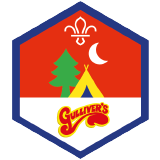
Learn how to keep a tent tidy
You’ll need
- Magnifying glass (optional)
Before you begin
- Use the safety checklist to help you plan and risk assess your activity. Additional help to carry out your risk assessment.
- Make sure all young people and adults involved in the activity know how to take part safely.
- Make sure you’ll have enough adult helpers. You may need some parents and carers to help if you’re short on helpers.
Setting up this activity
- Find a couple of willing helpers among your Young Leaders or adult volunteers. They’ll be ‘tent detectives’ and check tents for good practice, safety and cleanliness. Detectives might like to use props, such as a magnifying glass
- Young people could also be tent detectives and might need help from an adult.
Tidy those tents
- Gather everyone together.
- Ask if anyone knows how to keep their tent or sleeping area clean, safe and tidy. Let a few people share their ideas.
- For older groups, you may just want to read through the rules, then see if anyone can think of anything else to add in.
- For younger groups, write out the following rules on paper, or print them out, then hide them around the space:
- All clothes should be put away, with clean and dirty items kept separately.
- Shoes or boots should be taken off outside tents and stored where they can’t be tripped over.
- Sleeping bags should be loosely rolled up during the daytime, so there’s space to move around.
- Bedding should be kept away from tent edges, as they’re usually first to get damp when it rains. If possible, leave space between each other’s bedding so there’s room to move.
- Wet clothes should be hung up to dry, and kept away from dry clothes and sleeping areas.
- Any litter should be recycled or thrown away immediately.
- Food, such as snacks, should be kept in airtight storage containers in the kitchen area.
- Tell everyone that there's 7 rules hidden in the space that they need to find. You may want to add your own rules too. Let everyone have 10 or 15 minutes to find them.
- Once they’ve all been found, choose some people to read them out. Ask if there are any other rules people could think of.
- Place all the pieces of paper with the rules on somewhere where everyone can see them.
- Now, tell everyone you’re going to play some games or have a camp tent detective to make sure everyone can keep a tent tidy.
Detective visits while on camp
- Gather everyone together at the start of camp and remind everyone about what they need to do to keep the tent tidy. You may wish to have them as camp rules.
- Explain that there’ll be tent detectives coming to check the tents and tell everyone who the detectives are. Everyone should be reminded that the detectives can visit anytime, so they should make sure their tent is always tidy.
- Throughout the camp, the detectives should visit the tents in pairs at a quiet time when no-one is in the tents, such as during lunch or during an activity.
- Detectives should have always be two adults, or with two adults, if they’re entering tents with young people inside.
- The detectives could score or mark the spaces each day. They could leave stickers or post it notes to tell people what they’ve done well, or you could have scoresheets for the different areas.
- You may want to have an announcement at dinner-times to point out what could be better overall and praise good tents. You may want to have a tidy tent of the day or of the week, with that tent getting a prize.
- Remind everyone in the group to make improvements to their tents and sleeping areas, and continue their good habits in case the detectives visit again.
Detective visits at sessions
- Before the session, pitch some tents and add some items in them.
- In each tent, make sure that some things are untidy or messy, which people have to spot.
- Ask everyone to get into small teams.
- There’s several ways you can play this game in a session to practice keeping tents tidy:
Give each team a tent to tidy, then the tent is inspected by the detective to see if the team spotted all the problems.
To make it harder, the team could call over the detective when they think they’re ready and have fixed all the problems.
The detective can come and check their tent, then tell them if they’ve got them all or how many more things they need to check. You can give as much detail as you’d like.
The first team to get all the problems, wins.
Everyone can be detectives and they have to visit each tent, either in pairs or individually.
As they visit each tent, they should write or draw all the problems they can spot.
Give everyone 10 minutes, and whoever spotted the most correct things that were wrong with the tents, wins.
The detectives should point out problems and praise good points too.
Give everyone ten minutes to study the tents and make notes of anything they can see that might be wrong.
After ten minutes, everyone should close their eyes. A young leader or adult volunteer should then make five, or more or less, differences to the tent to correct the problems/mess.
When the changes have been made, everyone can open their eyes and try to spot what’s changed.
You can play this in teams, with the first team to guess them all winning.
You can also play this in reverse, where the tents are tidy to begin with. People need to then spot the differences and try to find what’s been made messy.
Reflection
This activity helped everyone in the group know how to keep a tent tidy, making sure we all have a fun and safe environment to camp in.
Why do you think we need to be tidy? It can stop us losing items, makes the tents clean and stops us having any unwanted pests.
Tidying rules are also designed to make camp life easier. How did it feel to have a tidier space? What did you do to make sure it was tidy? Why might they make it easier? For example, separating their clean and dirty clothing can help us to do laundry and stops everything getting messy.
This activity also needed people to have good teamwork and communication. You may have let different people look after different rules. Did people take on different roles in the team? For example, did someone check for litter, while someone else tied shoes?
You may have got feedback or had to help each other remember the rules. How did you communicate with others about what needed doing? Did everyone make sure they played their part for being responsible for their area?
You may have felt more responsibility too. Did you feel more responsible as you didn’t want to let your team down? What went well and what could have gone better?
Safety
All activities must be safely managed. You must complete a thorough risk assessment and take appropriate steps to reduce risk. Use the safety checklist to help you plan and risk assess your activity. Always get approval for the activity, and have suitable supervision and an InTouch process.
- Outdoor activities
You must have permission to use the location. Always check the weather forecast, and inform parents and carers of any change in venue.
- Heavy and awkward objects
Never lift or move heavy or awkward items alone. Ask for help or, if possible, break them down into smaller parts.
- Poles and long objects
Be careful when moving poles or long items. Take care if the ends are sharp. Have appropriate supervision for this activity.
Make feedback clear and simple so everyone has tasks they can achieve easily.
All Scout activities should be inclusive and accessible.
Set up a deliberately messy, unsafe tent or sleeping area, then separate everyone into small detective groups, so they all get the chance to spot and sort out the problems.
Think about ways you could encourage all the young people to be tent detectives and carry out inspections. Could Lodge Leaders check the tents of their lodges, for example?

